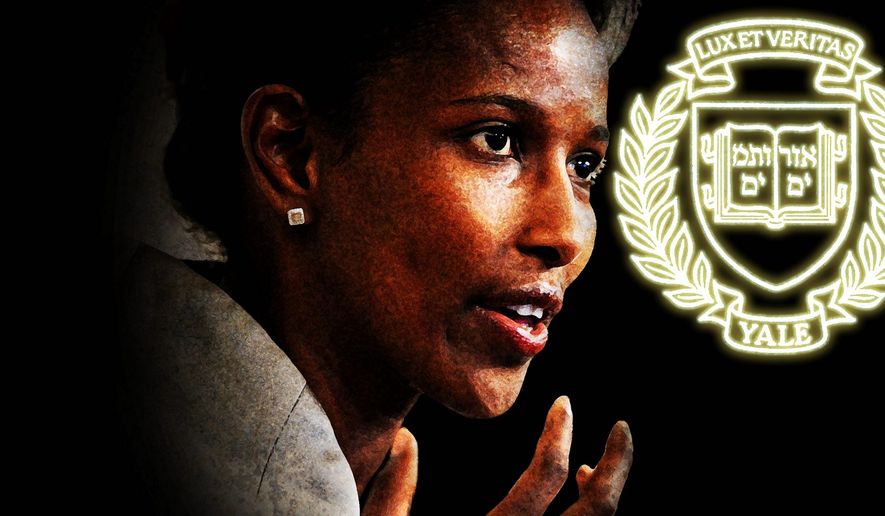OPINION:
Airliners that routinely complete their flights, like a dog that bites a man, naturally get no headlines. A flight must crash and burn to get attention, like the man who bites a dog. It’s controversy that sells tickets, particularly on campus.
When Ayaan Hirsi Ali, the brave human-rights activist and a native of Somalia, spoke at Yale last week, 300 students turned out to listen. Others were turned away because security was so tight. The sponsors were almost apologetic because there was no controversy.
This is how free speech can work on a campus with bold academic leadership behind it. Academics think the campus is a stronghold of free speech, but that’s often not true. Yale’s new president, Peter Salovey, not only talks the talk, but walks the walk. If only he could be the pacesetter.
In his welcoming remarks to the class of ’18, he talked about how important “freedom of expression” is to everyone, and how it’s often under threat on the American campus. Over the past two years on certain campuses, the freedom to express ideas has been in peril, with invitations to provocative speakers withdrawn under pressure. He named no names, but he, like many of us, might have been thinking of Ayaan Hirsi Ali and her experience at Brandeis University, where she was to receive an honorary degree and address the graduating class. When Muslim students protested, the president of Brandeis, one Frederick Lawrence, quickly caved. Her experience at Yale is instructive — and encouraging — by comparison.
The Brandeis president is a former civil rights lawyer, and he talked the talk, but ran away like a frightened rabbit. This is a man who once wrote that “if free speech should flourish anywhere, it is within the hall of a university.” That sounds brave indeed, but intimidation by children suggests cowardice. The intimidation by the Muslim students, supported by some sympathetic professors, was organized and abetted behind the scenes by the Council on American Islamic Relations (CAIR), which called Miss Hirsi Ali a “notorious Islamophobe.”
The New Criterion, the conservative journal of cultural criticism, observes that well-meaning and politically naive people think CAIR is the innocent equivalent of the Knights of Columbus or B’nai B’rith, but columnist Andrew McCarthy of National Review accurately describes it as an “Islamic supremacist organization masquerading as a civil rights group.”
Some might give the president of Brandeis a pass as a naif, but his naifhood smells like spineless mendacity when he hides behind ignorance as defense for canceling Miss Hirsi Ali’s invitation to his campus. The university says that “we were not aware of Ms. Hirsi Ali’s record of anti-Islam statements.” However, her criticism of Islamic suppression of women has been widely reported in the public prints.
Ignorance is the last refuge of scholars, to paraphrase Dr. Johnson, but Miss Hirsi Ali’s observation sounds closer to the mark: “They simply wanted me to be silenced.”
Several weeks before Miss Hirsi Ali was scheduled to speak, Yale’s Muslim Students Association tried to persuade the new president to follow the ignoble example of Brandeis. The students pressured the sponsoring group to disinvite her, and when that didn’t work, they said if she must be allowed to speak it must not be about Islam, or another speaker should be hired to contradict her. Failing all that, they circulated an open letter signed by several student groups. Some of the signatures were apparently forged.
The Muslim students said Miss Hirsi Ali, author of several books on Islam, didn’t “hold the credentials” to address an audience on the issue of Islam. They dismissed her genital mutilation, performed by a relative when she was a young girl, as merely “an unfortunate circumstance.”
Perhaps the fatwa against her could qualify as a credential. Or the brutal murder of a colleague might count. The bullet-riddled body of Theo van Gogh of Amsterdam, with whom she worked on a film critical of Islam’s treatment of women, came with a note attached, threatening Miss Hirsi Ali with a similar death. The title of their movie was “Submission,” which she says is the core mandate behind Islam. She refuses to submit.
The organization that invited her to Yale is named for the late William F. Buckley Jr., whose book, “God and Man at Yale,” helped ignite the conservative movement. The president of Yale guaranteed their speaker her free speech and provided security for her. Yale thus trumped Brandeis. Still, Miss Hirsi Ali deserves the last word to challenge the Muslim students. She asked them why they want to prevent her speaking about the victims of Islamic injustice when they should be asking questions of those perpetuating the injustice. It’s a good question.
Suzanne Fields is a columnist for The Washington Times and is nationally syndicated.




Please read our comment policy before commenting.